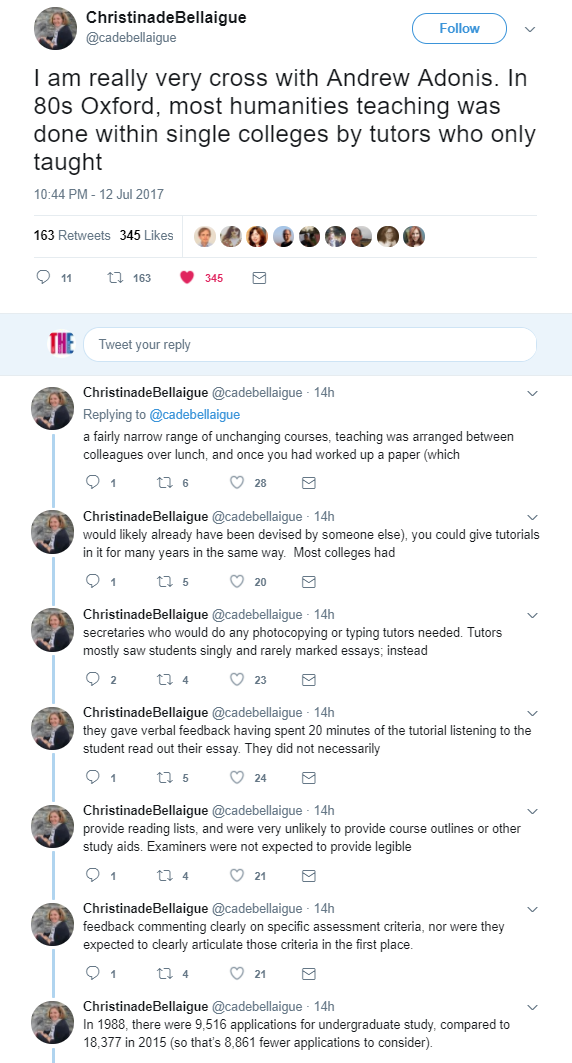It’s been a busy couple of days on Twitter for Lord Adonis, the former Labour minister for education who was director of the No 10 policy unit when Tony Blair’s government increased the amount that universities could charge for tuition in 2004.
Since then, he has had a change of heart, writing in The Guardian last week that while he was “largely responsible” for the 2004 increase, it was now his opinion that the fees system had become a “Frankenstein’s monster”, saddling students with £50,000-plus debts when they graduate.
It is a sentiment that many academics – and some vice-chancellors – would back. His hope that the next generation of students and graduates will be “spared crippling debts, and the cause of social mobility and fairness will prosper again” is an admirable one after all (although whether scholars will be quite so impressed by his U-turn on this issue is another matter for another day).
His views on Twitter about vice-chancellor pay levels will also have struck a chord with many in the academy.
I will ask Govt to justify vice-Chancellors' inflated pay of up to £450k in Lords on Thurs. They shd be paid no more than the PM #fairshares
— Andrew Adonis (@Andrew_Adonis) July 10, 2017
He also questioned Times Higher Education’s record on covering university pay levels. Regular readers of THE will be aware of our annual publication of vice-chancellor pay levels (and indeed pay in the sector more widely), and our relentless coverage of how the issue affects those working in universities (see here, here, here, here, here and here, for example. There are more). It is an important issue and it is to be welcomed that Lord Adonis will be raising it today in the House of Lords.
He won’t find favour with academics, however, for a series of criticisms of those who work in the higher education sector. A former academic himself, Lord Adonis drew on his own experiences in academia at the University of Oxford in the late 1980s to question those working in the sector today – initially about their “three-month summer holiday” and the time that they spend teaching.
Entirely agree. Why do unis regard 3 mth summer holiday as sacrosanct? No other walk of life where this is true. Pure vested interest https://t.co/LipLl8c3Z4
— Andrew Adonis (@Andrew_Adonis) July 12, 2017
No, most academic staff don't teach enough. Many do virtually none. I spent 10 years in the best uni in the world (Oxford!) and I know that https://t.co/vRT9Bblv5G
— Andrew Adonis (@Andrew_Adonis) July 12, 2017
And, before the flood of Angst arrives, I got a PhD in 3 yrs, taught a full load for the next 3 yrs, wrote 4 books + articles before I left https://t.co/G34NklLGaw
— Andrew Adonis (@Andrew_Adonis) July 12, 2017
However, there was one tweet in particular that really got academics’ backs up.
Thank you! Truth is, every job I have done since being a uni lecturer was FAR more demanding in terms of requirements to 'do' and 'produce' https://t.co/NsDc9IcrTv
— Andrew Adonis (@Andrew_Adonis) July 12, 2017
It is obviously something he believes – and only he would know about the demands of the various jobs in his own career, so we have to take his word. However, it was the suggestion that today’s academics are operating in a similar world to the one that he inhabited as an Oxford scholar some decades ago that had people riled. And they didn’t hold back.
Christina de Bellaigue, Jackson fellow and tutor in history at Exeter College, Oxford, sent out a series of tweets in response.

You can read more here. There was no shortage of people echoing Professor de Bellaigue’s sentiments.
I worked from 16. Became academic at 38. Never worked harder in my life as I have as an academic. Love it, but Oxford is not all of UK HE.
— Prof. Colin Talbot (@colinrtalbot) July 12, 2017
I worked full time + two part time jobs, & was a union officer & local councillor whilst doing my PhD. 1st academic job was still harder.
— Dr. Steve Cooke (@SteveCooke) July 13, 2017
An Oxford Fellowship pre-REF, Pre-TEF, pre-fees is not the same as being a "uni lecturer" today. My colleagues work their socks off.
— Matthew Weait (@ProfWetpaint) July 13, 2017
Andrew's experience as a Fellow in a privileged position years ago compared to the demands on academics across HE now pic.twitter.com/PakfdqW6wP
— Richard Johnston (@DrRichJohnston) July 13, 2017
Katie Beswick, a lecturer in drama at the University of Exeter who has also worked at Queen Mary University of London and the University of Leeds, wrote a blog in response to Lord Adonis’ comments.
“I take issue with Adonis’ tweets not so much because of their inaccuracy (yes, they are inaccurate, but also, yes, things do slow down in the summer for many of those academics fortunate enough to be employed on decent permanent contracts), but because of the ideology that underpins them: the ideology of ‘hard work’ as a virtue, of ‘productivity’ as necessarily positive,” she writes.
“I don’t want to live and work in a world where the only important thing is how much you ‘do’; where you are measured by how much you ‘produce’. Nothing is improved in either material or spiritual or creative (or even economic) terms by blind ‘productivity’. You cannot advance knowledge (the cornerstone, surely, of an academic career) by just churning out more and more and more stuff because Andrew Adonis thinks that the point of any job is to do as much as possible, regardless of what actually needs to be done.”
There were plenty more discussions besides the ones covered here – head over to Lord Adonis’ Twitter feed for the full low-down.
Register to continue
Why register?
- Registration is free and only takes a moment
- Once registered, you can read 3 articles a month
- Sign up for our newsletter
Subscribe
Or subscribe for unlimited access to:
- Unlimited access to news, views, insights & reviews
- Digital editions
- Digital access to THE’s university and college rankings analysis
Already registered or a current subscriber?








